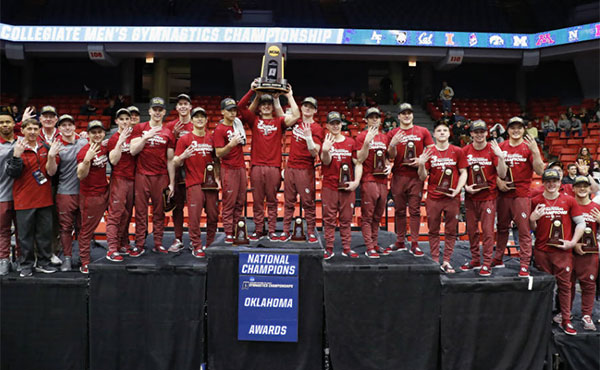
By Nick McCarvel
It was November 2017 and things weren’t looking good for coach Mark Williams and his seemingly unbeatable University of Oklahoma men’s gymnastics team, at the time the three-time reigning NCAA national champions.
As a squad, they had been through at least six recent major surgeries. A crew of inexperienced gymnasts (fewer than half the team had competed at NCAAs the prior season) was further hampered by a false sense of security as the best-of-the-best in college gymnastics, and it left the Sooners in “shambles,” as junior Levi Anderson would later describe it. Morale was low. Coach Williams even kicked the team out of the gym a couple times – something he rarely does.
Williams, one of the sport’s great coaches, knew something needed to be done.
“We just weren’t very good,” he told USA Gymnastics in a recent interview. “We had a lot of guys that were new that weren’t contributing the way that we needed them to. Those early months were a struggle, honestly… very challenging.”
What would transpire over the next several months is what would leave Williams shaking his head in the recent days on walks with his dog at home, thinking to himself: “Did we really just do that again?”
Yes. Yes, they did.
The Dynasty Continues
No matter the struggle that Oklahoma went through as a team (and we’ll get to that more later), the end result was a familiar one in collegiate men’s gymnastics: They’d win their fourth consecutive NCAA title, tying Penn State University for the all-time record at 12 and becoming the first four-peat team since the University of Nebraska from 1980 to ’83.
Four years and four national titles, not to mention a 97-0 record in that time, an undefeated spell for the team’s two seniors (and captains), Hunter Justus and Reese Rickett.
“[This] team is the most successful in Oklahoma history,” Williams would tweet after nationals in Chicago. He added on the phone: “Winning is always sweet. It’s always amazing.”
“Standing on top of that podium alongside all of the brothers that we created this year, everything we had to go through (and) to be able to look at those guys in the eyes and know what we had accomplished, I think that’s what makes it different,” Levi Anderson explained in a separate interview.
“Every championship is special, but to be able to go through surgeries and freshmen coming in and people not being experienced enough, to come out on top, that’s one of those things that might go unseen, but it was unbelievably remarkable.”
Five points behind midway through the team final at NCAAs, Oklahoma would end up winning with a 414.858 total, three safe points ahead of Minnesota and Illinois, who finished second and third.
It’s a ninth national title for Williams in 19 seasons as head coach.
“I celebrated more than I had in the previous three years,” Williams admitted. “Everyone expected us to win (those years), but this year, I don’t think that was a certainty until the last guy landed on his high bar. I got to jump up and down a little bit. That felt exciting.”
The Struggle is Real
When things were less exciting – and more frustrating – last fall, Williams brought each team member into his office and individually sat down with them to discuss goals and expectations. He needed something big to change to awaken the juggernaut that he had built OU men’s gymnastics into.
“My standard as a coach hadn’t changed just because we were struggling,” he said. “I felt like we had guys that were good and we weren’t getting the team effort because not everyone had bought in, and I think there was this sense of complacency because we had won… a lot. Some of them had forgotten how we got to the place where we were always good. It wasn’t OK. I called out my captains because they weren’t doing a real good job in getting the most out of this team.”
One of the big moves that Williams made was to add junior Yul Moldauer, the 2016 NCAA all-around champion, as a captain alongside seniors Justus and Rickett. Not the loudest athlete in the gym, Williams knew that Moldauer was the best – and that he could lead by example.
“(Yul as captain) gave us the guy who is doing it in the gym day-in and day-out as an example,” Williams said.
Moldauer – who would go on to win another all-around title this year in addition to three apparatus titles – found his stride eventually.
“I didn’t know how (being captain) was going to go because I feel like I’m the young guy in the gym,” he said. “But when I took on that role, I reached out to last year’s captains and figured out what my role was alongside Hunter and Reese. I really bought into it.”
So did the rest of the team.
On Feb. 24, the Sooners had a knockout meet against Navy which led Williams to tell them afterward he thought they had a chance to win a national title once again. It was the first time he had said that to the team out loud the entire season.
“We were in this space as a team at the beginning of the year where we thought we were going to have to reset for the year,” Moldauer recalled.
Anderson added of the struggle: “To be honest with you, from the beginning, the journey felt unattainable. We thought the end goal wasn’t possible. We had countless problems inside and outside of the gym. As years go on… winning gets harder. It’s very hard to train as though you’re the number two team. Slowly, as the season progressed, we started to see it come together. It really was just about putting our heads down and getting to work.”
The Final Act
We all know how this ends: With another national title for Oklahoma – and since, an outpouring of accolades in and around Norman, as well as the from the gymnastics community overall.
Moldauer gets his due, as well, as national champion once again, and for tying an NCAA record for seven overall titles. He’ll return next season for his senior year. And you’d guess as a captain.
“(Yul is) a special kid,” Williams shared. “He had been out because of a back issue towards the end of the season and we had to be careful about the turns that he took and how much work he was allowed to do. The kid was just unbelievable. He adapted to what was needed. He was able to adjust and be the tremendous competitor that he is when it mattered most.
“In the string of the last four championships, this was the most we had to come through as a team,” Williams added. “When you come through the surgeries that we did, that’s a lot to get through. It was an entire team effort.”
“Honestly, I don’t really care about what I achieved, but what we achieved as a team is outstanding,” a candid, soft-spoken Moldauer said. “(Once) we started the actual season, we realized we were a better team than we saw. It was crazy to think that at the start of the season we didn’t think we were going to be able to be top three (in the country). We ended up coming out on top, which is absolutely crazy. I had tears in my eyes.”
Back in the fall, when things weren’t going well but coach Williams had to make preliminary travel arrangements for NCAAs, he booked the team early out of Chicago Sunday morning – the day after nationals ended. “I don’t want to stick around Chicago because we’re not going to win,” he recalled telling his wife. “It’s just going to be waiting to leave because there’s nothing to celebrate.”
Less than six months later, the team rose at 4 a.m. on that Sunday morning to catch their flight back to Oklahoma.
They were national champions once again.
“We still have a lot of celebrating and reminiscing to do,” Anderson said, laughing.
On paper, greatness can often appear to come easily. Not for this team. But in a certain sense they wouldn’t have it any other way. This is what champions are made of.




